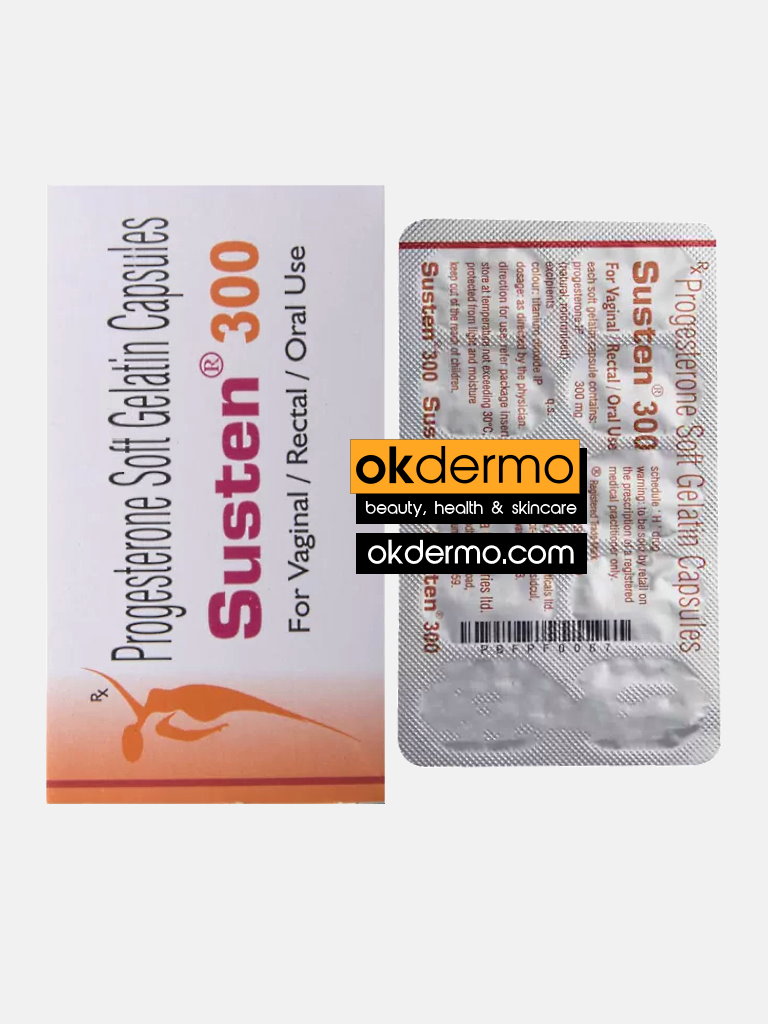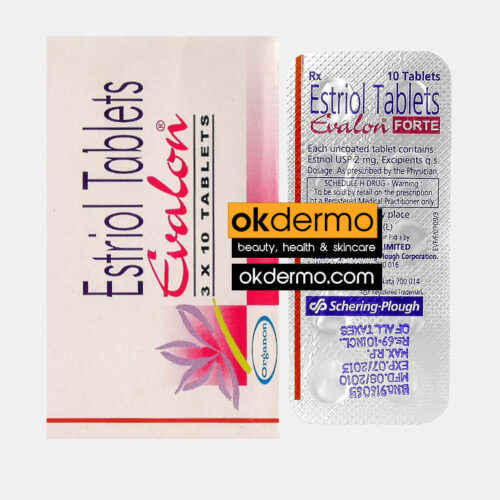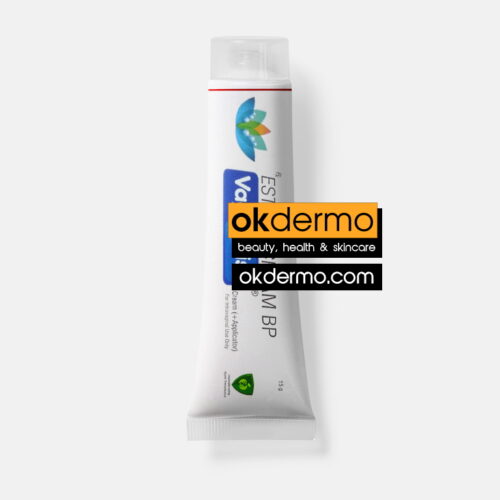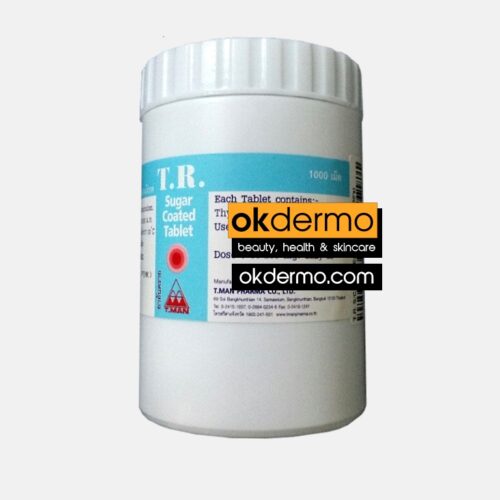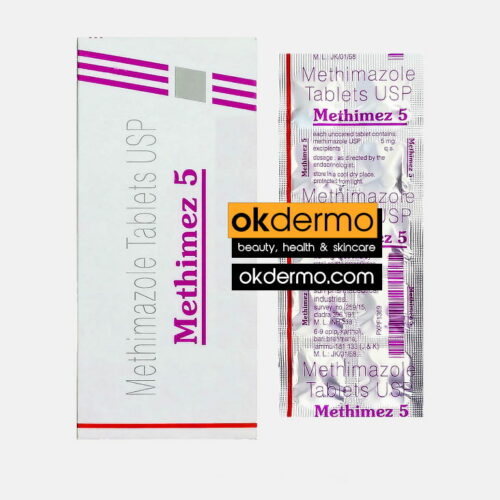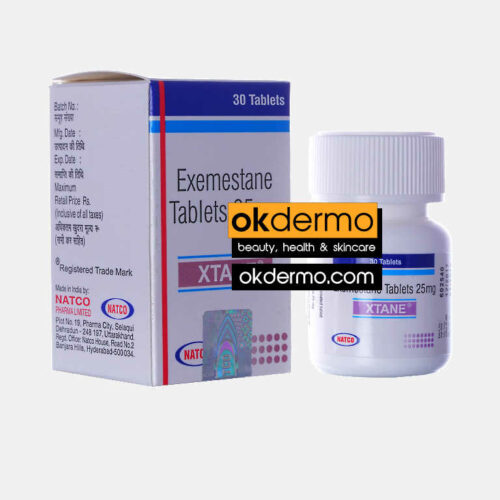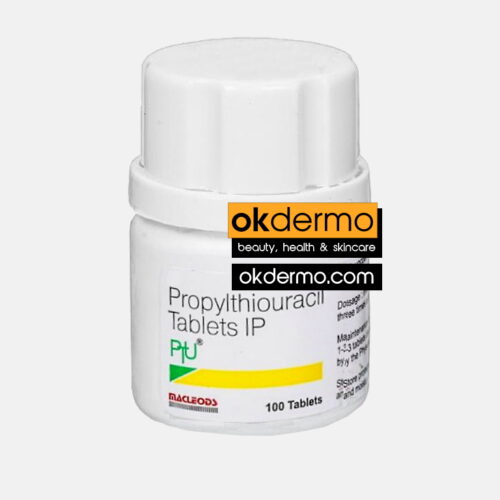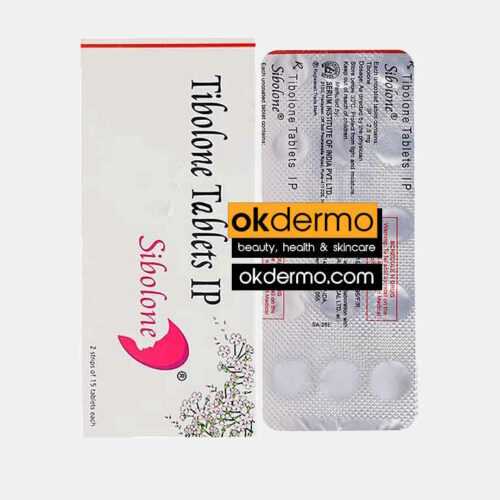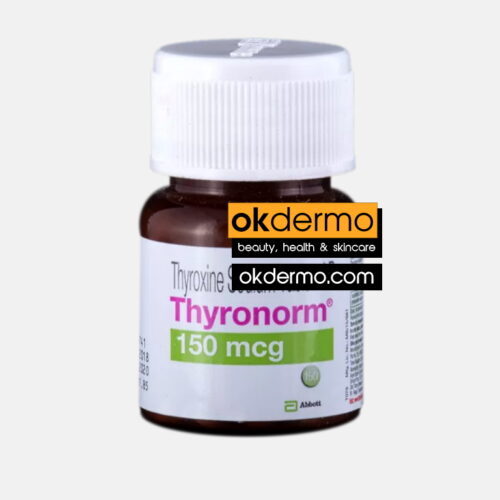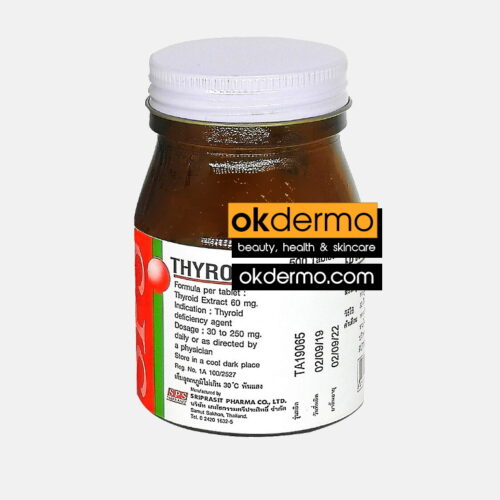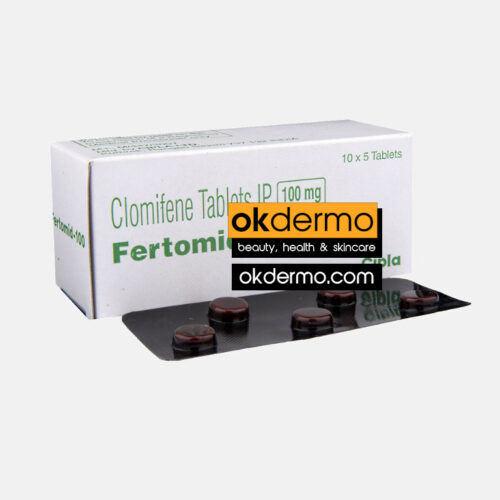Description
What is Micronized Progesterone 100mg-400mg Capsules Susten®
If estrogen is the superhero sex hormone in women, then progesterone is its trusty sidekick. Progesterone has many of its own important functions in your body, but it also plays a big role in balancing out the effect of estrogen, especially in the lining of your uterus. Progesterone is mainly produced by a specific part of your ovary called the corpus luteum. The corpus luteum develops from the follicle that releases an egg at ovulation. After ovulation, the corpus luteum ramps up its progesterone production.
Progesterone is the dominant hormone in the second half or luteal phase of your menstrual cycle, and its role is to continue the work of estrogen in preparing the lining of your uterus for pregnancy. If the egg you released is fertilized by a sperm and you become pregnant, the corpus luteum continues to produce progesterone until about 10 weeks of pregnancy. Then, your placenta takes over. If you do not become pregnant, then your corpus luteum dissolves, your progesterone levels drop, you get your period, and a new menstrual cycle begins. In addition to the corpus luteum and placenta, progesterone is also produced but to a lesser degree by your ovaries and your adrenal glands.
Progesterone 100mg-400mg Capsules Susten® are used as part of a hormone replacement therapy (HRT) regime in women with an intact uterus, who are using HRT to relieve menopausal symptoms caused by estrogen deficiency. These include hot flushes, night sweats, sleeplessness, vaginal dryness, headaches, mood swings, lack of concentration and loss of energy. Progesterone 100mg-400mg Capsules Susten® are used in combination with oestrogen to reduce the risk of endometrial (uterine) cancer, which can develop in response to an oestrogen only HRT regime. Progesterone 100mg-400mg Capsules Susten® are also used as a component of transgender hormone therapy, to help stimulate the development breast development and reduce the production of testosterone, as adding a progestin with oestrogen is thought to help the feminization process for male to female transsexuals.
How does Progesterone 100mg-400mg Capsules Susten® work?
Progesterone 100mg-400mg Capsules Susten® contains the female hormone progesterone that is natural and micronized, or reduced to tiny particles, so that it is better absorbed and can be taken orally/vaginally/rectally. Endogenous progesterone is produced by the ovaries during the second phase of the menstrual cycle. It acts on the endometrium (lining of the uterus) converting the proliferating phase to the secretory phase. This causes the endometrium, which has thickened in response to oestrogen during the first half of the cycle, to stop growing and start secreting hormones and other proteins needed to maintain a pregnancy, if conception occurs; if not, levels of oestrogen and progesterone fall and the endometrium is shed (menstruation).
When used for combination HRT, Progesterone 100mg-400mg Capsules Susten®, containing micronized natural progesterone, works in the same way as natural progesterone and regulates endometrial growth in response to oestrogen, causing the thickened endometrium to be shed so that you will have a few days of withdrawal bleeding at the end of each month like a period. Progesterone 100mg-400mg Capsules Susten® reduce the risk of endometrial cancer which can be caused by oestrogen only HRT, without interfering with the beneficial effects of oestrogen, such as preventing bone loss and regulating cholesterol.
What does Progesterone 100mg-400mg Capsules Susten® contain?
Progesterone 100mg-400mg Capsules Susten® contain the active ingredient progesterone that is micronized in a suspension of in oil, and is used to reduce the risk of endometrial (uterine) cancer which can develop in response to an oestrogen only HRT regime. They also may contain sunflower oil (refined), soya lecithin, gelatin, glycerol, titanium dioxide
Progesterone 100mg-400mg Capsules Susten® for hormone replacement therapy
Progesterone 100mg-400mg Capsules Susten® contains the female hormone progesterone, that is micronized, or reduced to tiny particles, and mixed with oil so that it is better absorbed and can be taken orally. Progesterone 100mg-400mg Capsules Susten® are used as part of a hormone replacement therapy (HRT) regime, to reduce the risk of endometrial (uterine) cancer, which can develop in response to an oestrogen only HRT regime.
Taking oestrogen for HRT helps reduce symptoms of menopause caused by oestrogen deficiency, including, hot flushes, night sweats, sleeplessness, vaginal dryness, headaches, mood swings, lack of concentration and loss of energy. Oestrogen also has several other beneficial actions in various metabolic processes including bone turnover and lipid (fat) metabolism, but its effect of thickening the endometrium can lead to endometrial cancer in some menopausal women taking oestrogen only HRT. The micronized progesterone in Progesterone 100mg-400mg Capsules Susten® counteracts the effect of oestrogen and reduces the risk of endometrial cancer without interfering with the beneficial effects such as preventing bone loss and regulating cholesterol.
Progesterone 100mg-400mg Capsules Susten® for transgender treatment
Progesterone 100mg-400mg Capsules Susten® contains the female hormone progesterone, that is micronized, or reduced to tiny particles, and mixed with oil so that it is better absorbed and can be taken orally. Progesterone 100mg-400mg Capsules Susten® are used as a component of transgender hormone therapy for male to female transsexuals, to help stimulate the development of female sexual characteristics, such as breast development.
What is the difference between a natural progesterone like Progesterone 100mg-400mg Capsules Susten® (micronized progesterone) and a synthetic progesterone (progestin)? Progesterone 100mg-400mg Capsules Susten® contains micronized natural progesterone which is the female sex hormone belonging to the progestogen group, whereas progestins are synthetic progesterones which act in the same way as natural progesterone, but unlike natural progesterone they can be taken orally, as they are readily absorbed into the blood if swallowed as a tablet. Natural progesterone is not well absorbed in tablet form and until recently the only way to administer it was by injection. Micronized progesterone is natural progesterone reduced to tiny particles and mixed with oil so that it is better absorbed by the gastrointestinal system.
What are the side effects of Progesterone Capsules Susten®?
The most commonly reported side effects when taking Progesterone 100mg-400mg Capsules Susten® include drowsiness and sleepiness (which is why it is best taken at night). Other side effects include are breast tenderness and pain, abdominal bloating and pain, pre-menstrual symptoms, nausea, oedema, headache, skin rash and itching, insomnia and depression. More severe side effects include jaundice.
When should Progesterone 100mg-400mg Capsules Susten® not be used?
You should not use Progesterone 100mg-400mg Capsules Susten® if you:
- are allergic to micronized natural progesterone or any ingredients in Progesterone 100mg-400mg Capsules Susten®
- are pregnant or planning to become pregnant
- have a past or family history of carcinoma of the breast, endometrial carcinoma or liver disease
- have a history of thrombosis (blood clots) or stroke
- have porphyria (a metabolic disease resulting in abnormal pigment in the urine and skin)
- have abnormal genital bleeding of unknown cause
- are taking medicines that interact with Progesterone 100mg-400mg Capsules Susten® including anticonvulsants like phenytoin and carbamazepin, anti-infectives like rifampicin, rifabutin, nevirapine, efavirenz, bromocriptine (for menstrual problems).
How should Progesterone 100mg-400mg Capsules Susten® be taken?
You should take your Progesterone 100mg-400mg Capsules Susten® swallowed whole with a glass of water without food once a day preferably at bedtime, or used orally/rectally in addition to your usual oestrogen tablets. You should take your Progesterone 100mg-400mg Capsules Susten® for the last 12 days of a 28-day cycle and continue taking your Progesterone 100mg-400mg Capsules Susten® for as long as recommended by your doctor.
What is Progesterone?
Fertility and menstruation are largely controlled by hormones, and one of these hormones is progesterone. Understanding progesterone and what it does will help women make informed choices about their reproductive health. Progesterone is one of the progesterone steroid hormones. It is secreted by the corpus luteum, a temporary endocrine gland that the female body produces after ovulation during the second half of the menstrual cycle.
What does progesterone do?
Progesterone prepares the endometrium for the potential of pregnancy after ovulation. It triggers the lining to thicken to accept a fertilized egg. It also prohibits the muscle contractions in the uterus that would cause the body to reject an egg. While the body is producing high levels of progesterone, the body will not ovulate. If the woman does not become pregnant, the corpus luteum breaks down, lowering the progesterone levels in the body. This change sparks menstruation. If the body does conceive, progesterone continues to stimulate the body to provide the blood vessels in the endometrium that will feed the growing fetus. The hormone also prepares the limit of the uterus further so it can accept the fertilized egg. Once the placenta develops, it also begins to secrete progesterone, supporting the corpus luteum. This causes the levels to remain elevated throughout the pregnancy, so the body does not produce more eggs. It also helps prepare the breasts for milk production.
Women who have low levels of progesterone will have abnormal menstrual cycles or may struggle to conceive because the progesterone does not trigger the proper environment for a conceived egg to grow. Women who have low progesterone levels and who do succeed in getting pregnant are at higher risk for miscarriage or pre-term delivery, because the hormone helps maintain the pregnancy.
Signs of low progesterone include:
- Abnormal uterine bleeding
- Irregular or missed periods
- Spotting and abdominal pain during pregnancy
- Frequent miscarriages
- In addition, low progesterone levels can cause too-high levels of estrogen, which can decrease sex drive, contribute to weight gain, or cause gallbladder problems.
For women who are struggling to conceive or carry a pregnancy, the emotional toll of the struggle is high. While you need to pursue every potential cause of this problem, it’s valuable to talk to your doctor about your progesterone levels. If this is the problem, treatment is not difficult, but you should talk to your doctor before starting supplementation. Consider asking these questions:
- How can I determine if I am suffering from low progesterone levels?
- What other conditions could be causing my symptoms?
- How can I treat low progesterone levels?
- If I take supplemental progesterone, how long should I take it or when should I stop taking it?

